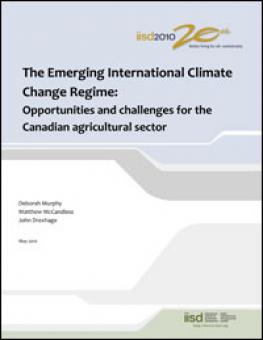
The Emerging International Climate Change Regime: Opportunities and challenges for the Canadian agricultural sector
Canada's agricultural sector will be affected by policy decisions that respond to the climate change challenge.
At the international level, decisions under the United Nations Framework Convention on Climate Change (UNFCCC)—such as the stringency of targets; the role of the land-use sector in offset markets; and the rules for accounting of GHG emissions in the land use, land-use change and forestry (LULUCF) sector—could affect Canadian farmers. The domestic policy response in Canada and other countries could raise concerns around agricultural offsets, competiveness and increased production of biofuels. Dealing effectively with climate change in a manner that accounts for the Canadian agricultural sector will require efficient and effective mitigation policies that follow best practices, capitalize on mechanisms in an international agreement, and avoid interference with global market development and access.This paper examines some of the challenges and opportunities for the Canadian agricultural sector that may arise out of the evolving national and international climate change regimes. The paper first describes mitigation potential in the agricultural sector in Canada. It then examines biofuels, agricultural offsets in an emission trading scheme and competitiveness concerns. The paper concludes with a summary of implications for policy development in Canada.
You might also be interested in
Powering the Clean Energy Transition: Net-Zero electricity in Canada
This brief explains how a shift to clean power generation can offer affordable, reliable electricity, benefiting households and businesses alike.
IISD Welcomes Draft Regulations for Oil and Gas Pollution Cap
A firm cap on emissions can provide certainty for industry to invest in decarbonization, while ensuring the sector is on a path to net-zero by 2050.
Canadians on the Hook for up to CAD 18.8 Billion in Ongoing Subsidies to the Trans Mountain Pipeline
Canadian taxpayers could end up contributing up to CAD 18.8 billion in subsidies to the Trans Mountain Pipeline if the federal government continues charging discounted transportation tolls to the oil industry, according to a new IISD report.
For Nature-Based Solutions to Be Effective, We Need to Work with Indigenous Peoples and Local Communities
Nature-based solutions have been praised as a promising approach to tackling the twin crises of climate change and biodiversity loss. But some Indigenous Peoples and local communities are questioning the legitimacy of the concept and what it symbolizes. It is time to listen to what they have to say.